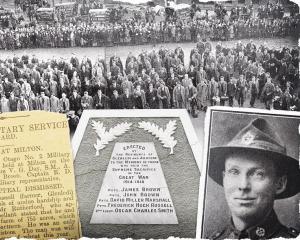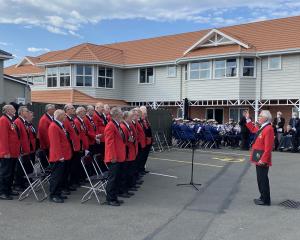
When New Zealanders followed Australians ashore at Gallipoli later in the morning of April 25, 1915, the man who should have been there writing about such a nation-defining time in New Zealand's history was still pacing the deck, at least metaphorically, of a troopship in the Indian Ocean.
Malcolm Ross, a Dunedin-born and raised journalist, was New Zealand's official war correspondent. He was appointed and paid by the Government to report on the activities of New Zealand troops in World War 1.
But from the outset, he was hampered in doing what he was paid to do. He was blamed at the time and has carried the stain of journalistic inadequacy ever since.
It could be argued that New Zealanders' understanding of their soldiers' role in the war was limited for years afterwards.
Only in relatively recent years have the stories of the major actions of Gallipoli, the Somme and Passchendaele been fully told.
Other war correspondents were showered with honours by grateful governments - if only for concealing some of the harsher wartime truths - and several in Britain were knighted.
A contemporary of Ross', Guy Scholefield, who throughout the war was the reporter in London for a group of New Zealand newspapers, including the Otago Daily Times, was made an officer of the Order of the British Empire (OBE) at the end of the war.
Ross was made nothing, except perhaps to pay for circumstances not entirely of his making.
There were two essential elements to what has been perceived as Ross' failure as a war correspondent, one personal and one political.
Ross was 55 when war began in August of 1914 and was already a man of not inconsiderable achievement.
He had some fame as a mountaineer; he was a journalist of standing and repute, having begun with the Otago Daily Times in 1882, spent a period as personal assistant to Sir James Mills, the founder of the Union Steam Ship Company (while continuing to moonlight for the ODT at night) and in Wellington from 1900, he was parliamentary correspondent for the Otago Daily Times and other papers and was the New Zealand reporter for The Times in London.
In the small political world of Victorian-Edwardian New Zealand, he was a man with connections.
He was also, it seems, seldom troubled by low self-esteem.
Among his close connections was the wartime prime minister, William Massey, who lived with Ross and his wife Forrestina (‘‘Bessie'') for a time in their house in Hill St that runs alongside Parliament.
The pair were said to be politically and socially close, but choosing his friends earned Ross enemies.
When New Zealand answered Britain's call and dispatched troops to wrest control of Samoa from Germany, Ross went along for the ride.
He reported, naturally enough, only for those newspapers which paid him and this provoked an angry denunciation from the Liberal Party leader, Joseph Ward, who read cronyism and favouritism between the lines.
Newspapers then, much more than they are now, were politically aligned. They fell into the camps of either the Liberals (the ‘‘Wardist'' papers) or the Reform Party.
Their political allegiance was represented most graphically in their editorial columns and other opinion pieces and seldom in their news reporting.
This distinction seemed not to matter to Ward. He argued that if the Reform papers were to have their own war correspondent, then so too should those newspapers which supported the Liberals (such as the Evening Star in Dunedin).
While Ross was reporting on the Samoan expedition, the New Zealand High Commissioner in London, Sir Thomas Mackenzie, of his own volition recommended to the British Government that New Zealand's official war correspondent would be Scholefield.
This was unwelcome news for the four papers Scholefield represented and they, not unreasonably, asked why the correspondent they paid should also write for all papers.
They saw no good reason in providing and subsidising the cost of coverage for their competitors.
In the meantime, the main body of the 1st New Zealand Expeditionary Force left New Zealand and teamed up in convoy with the Australian Imperial Force, which without any fuss had a Sydney Morning Herald reporter, Charles Bean, as the official Australian correspondent.
He had been voted in as correspondent by the Australian Journalists' Association, beating the brash Victorian, Keith Murdoch (the father of magnate Rupert), in the ballot.
Ignoring British decrees that each force could have only one correspondent, the celebrated poet and author Banjo Paterson and others also accompanied the Australians.
By this time, Scholefield's name was withdrawn as the New Zealand correspondent and he metaphorically shrugged his shoulders from 19,000km away: ‘‘I was a mere pawn and the dice were loaded against me when the Massey government was accused of favouring the papers I represented,'' he recorded.
The Liberal papers made no move to have a correspondent of their own, so New Zealand was faced with the prospect of its troops going into action but with no dedicated New Zealand reporter to write about it.
Eventually, the Government said it would make the appointment and bear the cost and it sought the help of the United (later New Zealand) Press Association in finding the right man.
Forty-six applications were reduced to a short list of four: Malcolm Ross, Fred Doidge of the Auckland Star, Syd Waters of The Press and Ernie Hall of the Evening Post.
The Cabinet made the final decision and it opted for Ross, with Massey saying he excused himself from the debate about his mate.
A weekly Auckland newspaper, the Observer, made its feelings plain about Ross before the appointment was made:
‘‘At first thoughts the plum was considered certain to go to His Vainness, Malcolm Ross, but his cake is already considered dough. Malcolm starts a story thuswise: ‘I went to the war. I had much trouble to get to the war. My head swelled with the heat of the sun. My horse fell from under me. I told General Blank how to conduct the siege. I believe we shall win' and so on.''
The Spectator, a Christchurch stablemate of the Observer's, was similarly scathing: ‘‘The wonder is any other journalist had the audacity to apply''.
The government job came with strings that would have tied the hands of any correspondent.
Ross was told he had to file his dispatches through the High Commissioner in London who would then forward to Wellington any, in whole or in part, he thought fit.
Stories had to be posted, not cabled, meaning that publication in New Zealand was weeks, sometimes months, after the events they described.
The dispatches were also subject to military censorship at the point of origin, then in London, then Sydney and then again in Wellington before they could be transmitted to newspapers.
‘‘Any smart reporter could do the work this correspondent will be permitted to do,'' the New Zealand Free Lance commented.
‘‘Men above the reporter class will not relish the idea of writing matter to be sub-edited by the Hon Thomas Mackenzie. So much at least is clear.''
Ross was also charged with gathering artefacts and ephemera for an eventual war museum (that never happened) and information for histories of the role played by New Zealanders in the war (that never happened either, at least not involving Ross).
The cumulative effects of the Government and newspaper dithering about selection of a correspondent meant that Ross did not leave New Zealand until early April and his first dispatch from Cairo was not until May 20, just five days short of a month after the initial landings on Gallipoli.
By then, the heroic imagery had been well and truly created not by a New Zealander, but by an Englishman and an Australian.
For all his efforts, Ross was never able to catch up.
The tone was set by Ellis Ashmead-Bartlett, a larger-than-life character who represented the English national dailies with the army in the field.
The first that New Zealanders knew of their compatriots fighting Turks on a hitherto little-known peninsula came from a brief official communique from London saying only that a landing had occurred.
It was Ashmead-Bartlett's dispatch that put flesh on to the bones and, in the case of Australia in particular, galvanised a nation.
With a well-honed skill for the dramatic phrase, a turn of hyperbole and some poetic licence - and possession of a few but not all the facts - Ashmead-Bartlett single-handedly with one dispatch established an enduring legend.
When the first boats reached shore, ‘‘The Australians rose to the occasion'', Ashmead-Bartlett wrote. ‘‘They did not wait for orders or for the boats to reach the beach, but sprang into the sea and formed a sort of rough line. They rushed the enemy's trenches, although their magazines were uncharged. They just went in with cold steel.''
When the Australians saw the heights confronting them, with a second line of Turkish defenders, ‘‘this race of athletes'' proceeded to tackle the cliff.
‘‘There has been no finer feat in this war than this sudden landing in the dark and the storming of the heights, and above all, the holding on whilst reinforcements were landed. These raw colonial troops in these desperate hours proved worthy to fight side by side with the heroes of Mons, the Aisne, Ypres and Neuve Chapelle.''
Ashmead-Bartlett's report was displayed as prominently in New Zealand newspapers as it was in Australian, but with some differences. The word ‘‘Australian'' became ‘‘Australasian'', even though New Zealanders were not part of the initial pre-dawn assault.
Ashmead-Bartlett's ringing phrase, ‘‘race of athletes'', which would undoubtedly have found proud acceptance in Australia, disappeared somewhere on its way across the Tasman. Rather than the ‘‘race of athletes'' proceeding to scale the cliffs, New Zealand newspapers preferred the neutral collective pronoun, ‘‘they''.
A British member of Parliament, Aubrey Herbert, was an intelligence officer on Gallipoli and he, rather astutely, reflected on the distinction between New Zealanders and Australians and also pointed, unknowingly, to the restrictions faced by Ross.
Speaking of the New Zealanders, he wrote: ‘‘The great distance from their own country created an atmosphere of loneliness. This loneliness was emphasised by the fact that the New Zealanders rarely received the same recognition as the Australians in the press, and many of their gallant deeds went unrecorded or were attributed to their greater neighbours''.
By the time Ross caught up, dispatches from Bean and Ashmead-Bartlett were regularly being run in New Zealand papers but with little mention of New Zealand troops.
The restriction on cabling just exacerbated Ross' problems. He wrote of the way the celebrated commander of the Wellington Battalion, Colonel William Malone, had transformed the defences of the key strongpoint of Quinn's Post.
But by the time that report appeared in New Zealand, it had already been reported by cable that Malone had been killed at Chunuk Bair.
Just as galling for Ross was that knowing he could not beat his rivals who were able to cable, he helped them instead.
Ross supplied details of the Chunuk Bair assault to Ashmead-Bartlett who embellished them in his normal cavalier way and these found their way into New Zealand papers way ahead of Ross's mailed reports.
Ross complained to the Minister of Defence, James Allen, and by the end of 1915 the restriction on cabling was lifted, but only to allow him to send brief messages.
The bulk of his reports for the rest of the war still had to be sent laboriously through Mackenzie in London by regular mail.
The effect in New Zealand was that there were frequent questions by Liberal members of Parliament and by newspapers about precisely where Ross was and what he was doing.
One editor dismissed Ross' reports as ‘‘piffle'' (he was in good company: the Australian general, John Monash, once described Bean's writing as ‘‘tosh'') and an MP suggested he should be recalled.
The Observer, in a piece scoffing at some of the excessive prose of Ashmead-Bartlett, snidely slipped in a mention of Ross ‘‘sitting in the Heliopolis Hotel in Cairo with a bottle of Burgundy and his favourite fountain pen''.
Editors and readers may have thought Ross's big moment came at last with the evacuation from the peninsula, a withdrawal conducted with all the secrecy, timing and resources that the original invasion lacked.
Newspapers recorded prominently the first evacuation story which was attributed to Ross. One headline in the multi-deck headlines of several papers said, ‘‘Vivid account by Mr Malcolm Ross''.
Even an MP soldier who had been dispatched to Gallipoli to report on conditions for the Government, Lieutenant-Colonel Heaton Rhodes, was full of praise for Ross' evacuation story.
The only problem was that Ross did not write it. He was on a hospital ship suffering from paratyphoid at the time, and his Australian colleague, Bean, wrote the dispatch for him, using Ross' name.
So there would be no misunderstanding, Bean cabled Allen and told him the circumstances.
As Ross began on Gallipoli, so he continued on the Western Front for the rest of the war, bedevilled by the government-imposed restrictions and reduced to writing ‘‘timeless'' stories rather than ‘‘hard'' news.
The censorship to which he was subject applied of course to all correspondents.
Towards the end of the war, the minds of politicians and soldiers turned to the publication of an official history and Massey and the 1st NZEF commander for most of the war, Alexander Godley, favoured Ross as the author.
‘‘I do not know of anyone who could do it better,'' Godley said in a message to Allen.
The army commandant in Wellington, Major-General Sir Alfred Robin, had different ideas, however, and was able to persuade Allen.
Robin wanted a military man as an author rather than a journalist and, in any case, seemed not to regard Ross very highly.
Ross knew of the politicking. Back in Wellington, he sent a message to his colleague Bean: ‘‘Allen has not been able to make up his mind yet who should write the Official History. All I know is that he would not like me to do it, but he is confronted with the advice of all the generals and several others that I ought to do it. I shall probably refuse to do it now if he does ask me, for a variety of reasons . . . ''
In the event, four rather anodyne volumes were written by four different soldiers and all Ross compiled after the war was a section in a compendium history of the war, published in London.
Bean, by contrast, carried out all his government had wanted at the outset. He edited the 12-volume Official History of Australia in the war and wrote four of the volumes himself; he wrote several other books about Australian involvement and he helped found the Australian War Memorial in Canberra.
Bean's diaries, letters and notes in Canberra represent a Rosetta Stone of understanding about Australia's role in the war. Ross left just a few letters.
Little wonder that Australia over the years has commandeered the New Zealand word ‘‘digger'' and almost taken as its own the previously shared noun, ‘‘Anzac''.
When Ross died in 1930, his widow received a sympathy letter from the army that said: ‘‘He did exceptionally good work and by his dispatches kept the relatives and friends of our soldiers well posted, as far as the regulations allowed, of their general welfare and of their activities''.
The Press Association, which at one point had complained to Allen of the inadequacy of Ross' reportage, said in an obituary: ‘‘His many articles sent to the Dominion from the front were read with deep interest, recording as they did the exploits of the New Zealanders in numerous engagements, and on his return to the colony [sic] he was congratulated far and wide for his excellent services''.
Ross would surely have seen the irony of the praise that went his way in death but which had been sparse in life.
- Malcolm Ross was the subject of Ron Palenski's MA thesis at the University of Otago.












